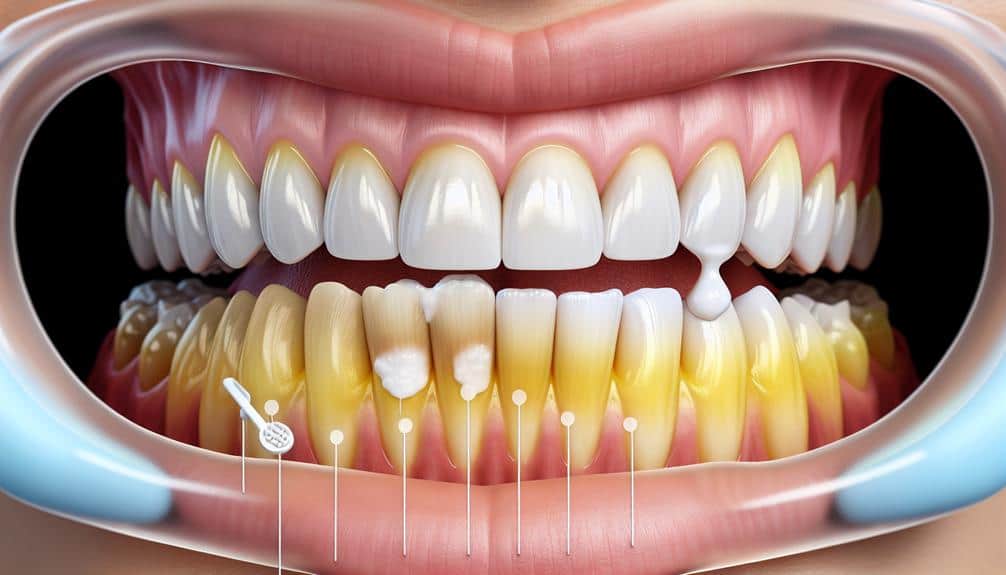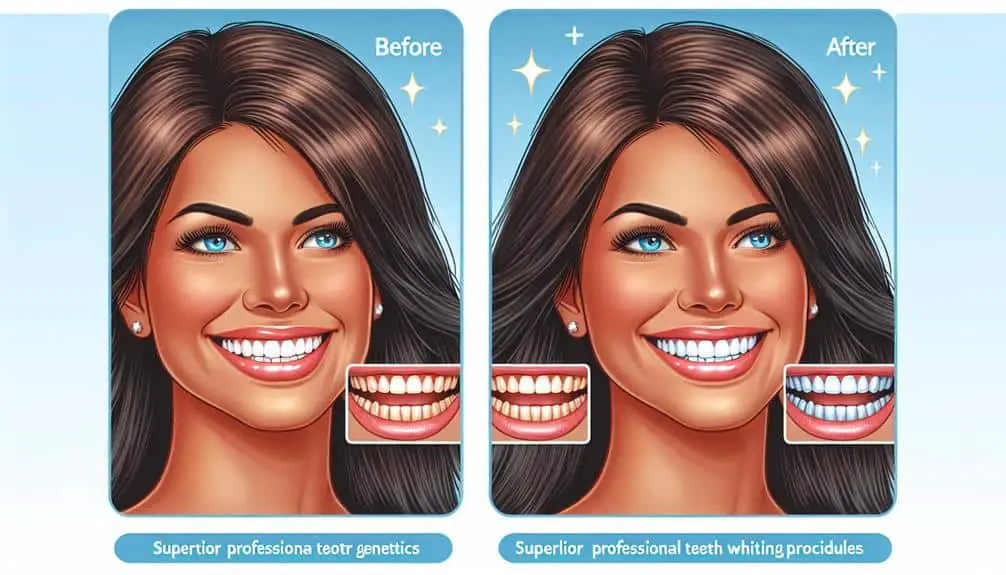Teeth whitening helps genetic discoloration by targeting inherited factors that affect your tooth shade. Genetic predisposition can cause teeth to appear yellowish or discolored. Whitening treatments counteract these effects, boosting your confidence and improving your smile's cosmetic appearance. Chemical reactions in whitening agents break down discoloration molecules, effectively bleaching your teeth. Professional whitening offers customized plans tailored to your genetics for long-lasting results. To maintain a bright smile long-term, consider lifestyle changes and oral hygiene practices. Learn more about how teeth whitening can address genetic discoloration and enhance your smile.
Key Points
- Whitening counters effects of inherited discoloration by targeting the root cause.
- Enhances confidence and self-esteem by improving cosmetic appearance of teeth.
- Personalized treatments based on genetic factors provide effective results.
- Chemical reactions break down discoloration molecules for effective whitening.
- Enamel protection during whitening ensures safety and long-lasting results.
Understanding Genetic Tooth Discoloration
When considering genetic tooth discoloration, understanding the underlying factors is essential for effective treatment and management. Genetic factors play a significant role in determining the color of your teeth. The color of your teeth can be inherited, meaning that certain genes passed down from your parents can influence how white or yellow your teeth appear.
Tooth color is a complex trait influenced by multiple genes. Variations in these genes can lead to differences in enamel thickness, mineralization, and overall shade of the teeth. Some individuals may have genetically thinner enamel, which can make the underlying dentin more visible and give the teeth a yellowish appearance. On the other hand, those with thicker enamel may have brighter, whiter teeth.
Understanding the genetic basis of tooth color can help tailor treatment approaches for genetic tooth discoloration. By recognizing the inherited nature of tooth color, dental professionals can better recommend personalized whitening treatments that address the specific needs of each individual.
Benefits of Teeth Whitening for Genetics
To maximize the effectiveness of teeth whitening for genetic discoloration, understanding how specific genes influence tooth color is key. Genetics play a significant role in determining the color of your teeth.
Here are four benefits of teeth whitening for genetics:
- Genetic Predisposition: Individuals with a genetic predisposition to tooth discoloration can benefit greatly from teeth whitening procedures tailored to their specific needs.
- Whitening Benefits: Teeth whitening can help counteract the effects of inherited discoloration by lightening the shade of the teeth, providing a cosmetic improvement.
- Boost in Confidence: By addressing genetic discoloration through whitening, you can enhance the appearance of your smile, leading to increased self-esteem and confidence in social interactions.
- Personalized Treatment: Understanding the genetic factors at play allows for personalized whitening treatments that target the root cause of discoloration, resulting in more effective and long-lasting results.
Mechanism Behind Teeth Whitening Results
Understanding the chemical reactions that occur during teeth whitening treatments is essential to grasp the mechanism behind the impressive results achieved. When you undergo a teeth whitening procedure, a chemical process takes place where the whitening agent, often hydrogen peroxide or carbamide peroxide, penetrates the enamel of your teeth. These agents break down the molecules responsible for the discoloration, targeting both extrinsic and intrinsic stains. The oxygen molecules released during this process react with the discolored molecules, effectively bleaching the teeth.
Enamel protection is a vital aspect of teeth whitening. The whitening agents are designed to primarily target the stains and discoloration without harming the enamel. However, it's essential to follow the guidelines provided by your dentist or the product instructions to prevent any damage to the enamel. Enamel protection is also enhanced by the inclusion of desensitizing agents in many whitening products, ensuring that the process isn't only effective but also safe for your teeth. Understanding this chemical process and the emphasis on enamel protection is key to achieving successful and lasting teeth whitening results.
Professional Whitening Vs. Genetic Discoloration
Professional teeth whitening procedures present a vital approach to addressing genetic discoloration compared to over-the-counter products. When it comes to combating genetic factors that cause discoloration, professional techniques offered by cosmetic dentistry play an essential role in achieving effective results. Here's why professional whitening stands out:
- Customized Treatment Plans: Professional dentists assess your specific genetic predisposition to discoloration and tailor the whitening treatment accordingly.
- Stronger Whitening Agents: Professional whitening treatments use higher concentrations of whitening agents that penetrate deeper into the enamel, addressing genetic discoloration more effectively.
- Reduced Sensitivity: Dentists utilize techniques to minimize sensitivity during and after the whitening process, ensuring comfort even when dealing with genetic factors.
- Long-lasting Results: Professional whitening provides more lasting results for genetic discoloration due to the advanced techniques and products used, compared to over-the-counter options.
Long-term Solutions for Genetic Discoloration
When seeking long-term solutions for genetic discoloration of your teeth, considering maintenance strategies is essential for preserving the results of professional whitening treatments. Lifestyle changes play a significant role in maintaining a bright smile. Avoiding foods and beverages that stain your teeth, such as coffee, tea, and red wine, can help prevent discoloration. Additionally, quitting smoking can have a positive impact on the long-term whiteness of your teeth.
Dietary adjustments are also vital for keeping your teeth looking their best. Eating crunchy fruits and vegetables like apples and carrots can help naturally clean your teeth and remove surface stains. Consuming dairy products rich in calcium can strengthen your teeth and contribute to a brighter smile.
Incorporating natural remedies and home treatments into your oral hygiene routine can further enhance the effects of professional whitening. Brushing with baking soda or using hydrogen peroxide as a mouthwash occasionally can help maintain the whiteness of your teeth. Remember, consistency is key in achieving and preserving a radiant smile despite genetic predispositions.
Frequently Asked Questions
Are There Any Alternative Treatments for Genetic Tooth Discoloration Besides Teeth Whitening?
For genetic tooth discoloration, consider cosmetic dentistry or natural remedies. Explore dental bonding as an alternative to teeth whitening. Home remedies may offer some relief. Discuss options with a professional to find the best solution for you.
Can Genetic Tooth Discoloration Be Completely Reversed With Teeth Whitening Treatments?
Teeth whitening can effectively reduce genetic tooth discoloration, but complete reversal may not always be possible. Long-term results depend on individual factors and maintenance routines. Keep in mind the influence of genetic factors on treatment effectiveness.
Are There Any Risks or Side Effects Associated With Teeth Whitening Procedures for Genetic Discoloration?
When considering teeth whitening for genetic discoloration, potential risks and side effects may include tooth sensitivity and gum irritation. Safety precautions such as using recommended products and following aftercare tips can help minimize these issues.
How Long Do the Results of Professional Teeth Whitening Typically Last for Individuals With Genetic Discoloration?
For individuals with genetic discoloration, professional teeth whitening can offer long-term maintenance of whitening results. On average, results typically last 6 months to 2 years, depending on lifestyle factors and aftercare practices.
Are There Any Specific Dietary or Lifestyle Changes That Can Help Maintain the Results of Teeth Whitening for Genetic Discoloration in the Long Term?
To maintain teeth whitening results for genetic discoloration long term, focus on dietary restrictions and excellent oral hygiene. Embrace healthy lifestyle habits and consistent preventive care. These actions can help preserve your bright smile.


